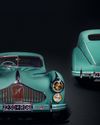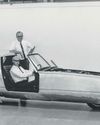
Change was afoot at Maserati in the early 1970s, following its acquisition by Citroën. The ageing Ghibli was beautiful but the mid-engined Bora and Merak were evidence of modern thinking at Viale Ciro Menotti. The Modenese firm simply needed a new front-engined gentleman's GT to match.
There was a brief exchange with Pininfarina, and Pininfarina's response exists in a private archive near Modena. However, because Pininfarina was the designer for Ferrari, Maserati's board chose Bertone for the task, which fell to design chief Marcello Gandini. The design would follow the wedge-shaped Alfa Carabo and Lancia Stratos Zero concepts, not to mention the Lamborghini Countach, but this was the late maestro's first opportunity to apply that design language to a front-engined car. As he once confirmed to me, his starting point was the Lamborghini Urraco, though the job wasn't as simple as moving the glasshouse back.
The result was stunning. Unusually for that era, the production models would be very, very similar to the prototype - which is the car you see here, chassis AM120-004. There from the start were the bonnet's asymmetrical louvres, hinting at a mighty motor beneath. The horizontal and vertical surfaces were given impeccably tapered transitions and flowed seamlessly and deliciously from nose to tail in a masterclass of subtlety. At the rear, Gandini set the tail-lights into a glazed panel, as he had on Lamborghini's Espada, only even more stylishly here. The Khamsin was ethereal and arresting, named after a Mediterranean wind.
Esta historia es de la edición September 2024 de Octane.
Comience su prueba gratuita de Magzter GOLD de 7 días para acceder a miles de historias premium seleccionadas y a más de 9,000 revistas y periódicos.
Ya eres suscriptor ? Conectar
Esta historia es de la edición September 2024 de Octane.
Comience su prueba gratuita de Magzter GOLD de 7 días para acceder a miles de historias premium seleccionadas y a más de 9,000 revistas y periódicos.
Ya eres suscriptor? Conectar

The Pro route to faster lap times
Mercedes-AMG GT 63 Pro 4Matic+

The power to corrupt
2024 Aston Martin Vanquish

Hyperactivate!
1967 Austin-Cooper MkII 998 by Crafted Classics Tuning Glen Waddington

De Tomaso Racing Blue Blood
IF THE MARQUE De Tomaso is mainly familiar to you through cars such as the Mangusta, the Pantera, maybe the Longchamps and, if you're next-level classic car geek, racers such as the P70, then the sheer variety to be found in this mammoth tome is going to come as something of a shock. There are literally dozens profiled here, and one or two will probably be news to even the most seasoned enthusiast.

The best watch in the world
We've been here, but it bears repeating these gems will soon be cheaper than a 1st class stamp

A star is reborn
This recently revived coachbuilt beauty made the final four at the Pebble Beach concours in August

REINVENTING THE WHEEL
The gyroscopically stabilised Gyro-X blurred the line between reality and science fiction. Sam Glover takes the prototype for a spin

SAYONARA GT-R
After a remarkable 17-year career, the supercar-humbling Nissan GT-R bows out on a high

Shiro Nakamura
Nissan’s long-standing Chief Creative Officer became architect of the marque’s style-led revival… and is also known as ‘Mr GT-R’

LIGHT SPARKS
How does the electric Tesla Roadster compare today?